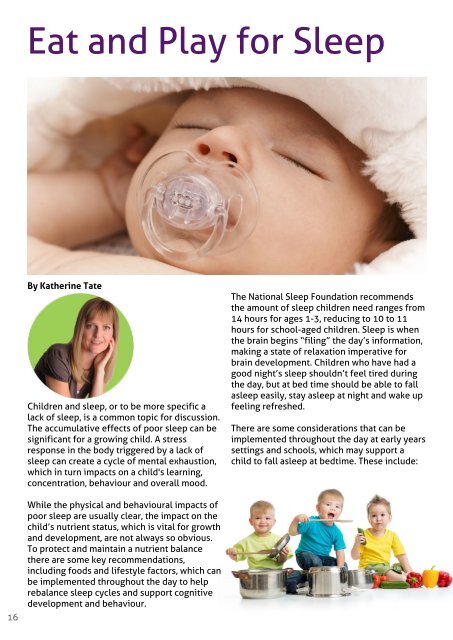volume-three-january-2015
You also want an ePaper? Increase the reach of your titles
YUMPU automatically turns print PDFs into web optimized ePapers that Google loves.
Eat and Play for Sleep<br />
By Katherine Tate<br />
Children and sleep, or to be more specific a<br />
lack of sleep, is a common topic for discussion.<br />
The accumulative effects of poor sleep can be<br />
significant for a growing child. A stress<br />
response in the body triggered by a lack of<br />
sleep can create a cycle of mental exhaustion,<br />
which in turn impacts on a child's learning,<br />
concentration, behaviour and overall mood.<br />
The National Sleep Foundation recommends<br />
the amount of sleep children need ranges from<br />
14 hours for ages 1-3, reducing to 10 to 11<br />
hours for school-aged children. Sleep is when<br />
the brain begins “filing” the day’s information,<br />
making a state of relaxation imperative for<br />
brain development. Children who have had a<br />
good night’s sleep shouldn’t feel tired during<br />
the day, but at bed time should be able to fall<br />
asleep easily, stay asleep at night and wake up<br />
feeling refreshed.<br />
There are some considerations that can be<br />
implemented throughout the day at early years<br />
settings and schools, which may support a<br />
child to fall asleep at bedtime. These include:<br />
16<br />
While the physical and behavioural impacts of<br />
poor sleep are usually clear, the impact on the<br />
child’s nutrient status, which is vital for growth<br />
and development, are not always so obvious.<br />
To protect and maintain a nutrient balance<br />
there are some key recommendations,<br />
including foods and lifestyle factors, which can<br />
be implemented throughout the day to help<br />
rebalance sleep cycles and support cognitive<br />
development and behaviour.

















